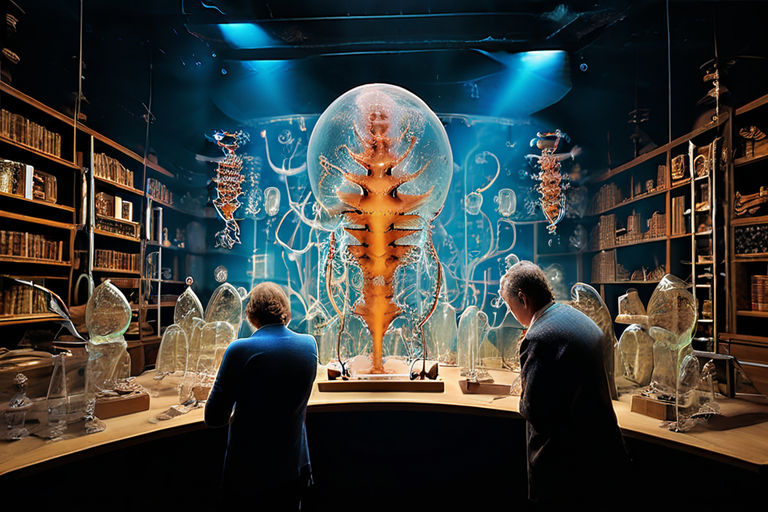Introduction
Exploring the Realm of Biological Discoveries
Biology, the science of life, has been a constant source of wonder and fascination for humanity throughout history. From ancient observations of nature to modern breakthroughs in genetic engineering, the field of biology encompasses a vast array of discoveries that have shaped our understanding of the world around us.
The Impact of Biology on Humanity
The study of biology has had profound implications for humanity, touching nearly every aspect of our lives. From advancements in medicine and healthcare to insights into the complexities of the natural world, biology has provided us with invaluable knowledge that has revolutionized our understanding of ourselves and the world we inhabit.
Early Milestones in Biological Discoveries
The Foundation of Cell Theory
One of the earliest and most significant milestones in biology is the establishment of cell theory. This theory, formulated in the 19th century by scientists such as Matthias Schleiden, Theodor Schwann, and Rudolf Virchow, proposed that all living organisms are composed of cells, and that cells are the fundamental units of life. This groundbreaking idea laid the foundation for modern biology, providing a framework for understanding the structure and function of living organisms at the cellular level.
Unveiling the Secrets of Genetics
Another pivotal moment in biological history was the discovery of the principles of genetics. Through the work of pioneering scientists such as Gregor Mendel, who conducted experiments with pea plants in the 19th century, and later researchers like James Watson and Francis Crick, who elucidated the structure of DNA in the 20th century, our understanding of heredity and genetic inheritance underwent a revolutionary transformation. These discoveries not only revealed the mechanisms underlying the transmission of traits from one generation to the next but also paved the way for advancements in fields such as biotechnology and genetic engineering.
Evolutionary Insights
Darwin’s Theory of Evolution
One of the most significant milestones in the history of biology is Charles Darwin’s theory of evolution by natural selection. Published in his seminal work “On the Origin of Species” in 1859, Darwin proposed that species evolve over time through the process of natural selection, whereby organisms with advantageous traits are more likely to survive and reproduce, leading to the gradual adaptation of populations to their environments. Darwin’s theory revolutionized our understanding of the diversity of life on Earth and provided a unifying framework for explaining the patterns and mechanisms of biological diversity.
The Role of DNA in Evolutionary Biology
In the 20th century, the discovery of the structure of DNA by James Watson and Francis Crick ushered in a new era of understanding in evolutionary biology. DNA, or deoxyribonucleic acid, serves as the hereditary material in all living organisms and contains the genetic information that determines an organism’s traits. By studying the genetic composition of different species and analyzing the similarities and differences in their DNA sequences, scientists have been able to trace evolutionary relationships and uncover the evolutionary history of life on Earth. DNA analysis has provided compelling evidence for common ancestry among species and has shed light on the mechanisms driving evolutionary change, such as mutations, genetic drift, and natural selection.
Advancements in Medicine and Health
The Discovery of Penicillin
One of the most transformative discoveries in the history of medicine was the accidental discovery of penicillin by Alexander Fleming in 1928. While studying bacteria in his laboratory, Fleming noticed that a mold called Penicillium notatum produced a substance that killed bacteria. This serendipitous observation led to the development of penicillin, the first antibiotic drug, which revolutionized the treatment of bacterial infections. Penicillin and other antibiotics have saved countless lives by combating infectious diseases that were once considered untreatable, making them a cornerstone of modern medicine.
Vaccines: Combating Diseases through Immunization
Vaccines represent another critical advancement in medicine and public health. Vaccination, or immunization, involves administering a weakened or killed form of a pathogen to stimulate the body’s immune system to produce a protective immune response. This immune response prepares the body to recognize and defend against future infections by the same pathogen, effectively preventing disease. Vaccines have played a pivotal role in eradicating or controlling numerous infectious diseases, such as smallpox, polio, and measles, saving millions of lives worldwide. They also contribute to herd immunity, protecting vulnerable individuals who cannot be vaccinated due to medical reasons. Vaccines continue to be a cornerstone of preventive medicine, offering safe and effective protection against a wide range of infectious diseases.

Understanding the Microscopic World
The Discovery of Microorganisms
The discovery of microorganisms, or microbes, marked a revolutionary turning point in our understanding of the invisible world teeming around us. In the 17th century, Antonie van Leeuwenhoek, using his newly invented microscope, became the first person to observe and document microorganisms, such as bacteria and protozoa, in samples of water and other substances. This groundbreaking discovery challenged the prevailing belief in spontaneous generation and laid the groundwork for the field of microbiology. Subsequent research by scientists like Louis Pasteur and Robert Koch further elucidated the role of microorganisms in causing disease and established the germ theory of disease, revolutionizing medicine and public health practices.
The Significance of Microbiomes
In recent years, there has been growing recognition of the importance of the microbiome—the diverse community of microorganisms that inhabit the human body and other environments. The human microbiome, which includes bacteria, fungi, viruses, and other microbes, plays a crucial role in maintaining health and well-being. These microbial communities interact with the body’s immune system, help digest food, produce essential nutrients, and protect against pathogens. Disruptions to the microbiome, known as dysbiosis, have been linked to a range of health conditions, including inflammatory bowel disease, obesity, and autoimmune disorders. Understanding the complex interplay between host and microbiota is a burgeoning area of research with profound implications for human health, agriculture, and environmental science.
Modern Breakthroughs in Genetic Engineering
CRISPR-Cas9: Revolutionizing Gene Editing
One of the most groundbreaking advancements in genetic engineering is the development of CRISPR-Cas9 technology. CRISPR-Cas9, short for Clustered Regularly Interspaced Short Palindromic Repeats and CRISPR-associated protein 9, is a powerful tool that allows scientists to precisely edit the DNA of living organisms with unprecedented accuracy and efficiency. Originally discovered as a bacterial immune system mechanism, CRISPR-Cas9 has been adapted for use in a wide range of applications, from basic research to potential therapies for genetic diseases. Its simplicity, versatility, and affordability have democratized gene editing, making it accessible to researchers around the world and sparking a revolution in biotechnology and biomedical research.
The Human Genome Project: Decoding the Blueprint of Life
Another landmark achievement in genetic engineering is the completion of the Human Genome Project (HGP). Launched in 1990, the HGP was an international research effort aimed at sequencing and mapping the entire human genome, the complete set of DNA instructions that make up a human being. After 13 years of collaborative effort, scientists successfully sequenced the 3 billion base pairs of the human genome, providing a comprehensive blueprint of our genetic makeup. The completion of the HGP has had far-reaching implications for medicine, biology, and biotechnology, enabling researchers to better understand the genetic basis of human health and disease, develop new diagnostic tools and treatments, and unlock the mysteries of human evolution and ancestry.
Exploring the Complexity of the Brain
Neuronal Plasticity: The Brain’s Adaptive Nature
Neuronal plasticity, also known as neuroplasticity, is a fundamental property of the brain that allows it to adapt and change in response to experiences and environmental influences. This remarkable ability enables the brain to reorganize its structure and function throughout life, shaping neural circuits and synaptic connections in response to learning, memory formation, and recovery from injury or disease. Neuronal plasticity underlies a wide range of cognitive processes, including learning new skills, adapting to changes in the environment, and recovering from brain injuries. Understanding the mechanisms of neuronal plasticity holds great promise for developing treatments for neurological disorders and enhancing cognitive function.
Mapping the Human Brain: Insights into Cognition and Behavior
Advances in neuroimaging technologies have revolutionized our ability to study the structure and function of the human brain. Techniques such as functional magnetic resonance imaging (fMRI), positron emission tomography (PET), and diffusion tensor imaging (DTI) allow researchers to non-invasively map brain activity, connectivity, and anatomy in unprecedented detail. These neuroimaging studies have provided valuable insights into the neural basis of cognition, emotion, perception, and behavior, shedding light on how the brain processes information and generates complex behaviors. Mapping the human brain has also led to new discoveries about the underlying mechanisms of neurological and psychiatric disorders, paving the way for more targeted interventions and personalized treatments.
Environmental Impact and Conservation Biology
Rachel Carson’s Environmental Activism
Rachel Carson, a pioneering environmentalist and marine biologist, played a pivotal role in raising awareness about the environmental impacts of pesticides, particularly through her groundbreaking book “Silent Spring,” published in 1962. Carson’s meticulous research and eloquent writing exposed the detrimental effects of the pesticide DDT on wildlife, ecosystems, and human health. Her work sparked a public outcry and led to increased scrutiny of chemical pesticides, ultimately catalyzing the modern environmental movement and the establishment of the U.S. Environmental Protection Agency. Carson’s legacy continues to inspire environmental activists and advocates for sustainable practices worldwide.
Biodiversity Conservation Efforts
Biodiversity conservation is a critical component of environmental stewardship and sustainable development. Biodiversity, the variety of life forms and ecosystems on Earth, is essential for maintaining ecosystem services, such as clean air and water, nutrient cycling, and climate regulation. Conservation efforts aim to protect and preserve biodiversity through a variety of strategies, including habitat conservation, species reintroduction programs, protected area designation, and sustainable resource management. International agreements such as the Convention on Biological Diversity (CBD) and initiatives like the United Nations Sustainable Development Goals (SDGs) underscore the importance of biodiversity conservation for achieving global environmental sustainability and ensuring the well-being of present and future generations.
Conclusion
Reflecting on the Impact of Biological Discoveries
Throughout history, biological discoveries have had a profound and far-reaching impact on society, shaping our understanding of the natural world and revolutionizing human health, agriculture, and technology. From early milestones like the discovery of cells and the principles of genetics to modern breakthroughs in genetic engineering and neuroscience, biology has continuously expanded the boundaries of human knowledge and transformed the way we interact with our environment and each other. These discoveries have not only improved our quality of life but also challenged us to consider the ethical and social implications of our expanding scientific capabilities.
The Ongoing Quest for Knowledge in the Field of Biology
Despite the remarkable progress we have made in understanding the complexities of life, the field of biology remains ripe with unanswered questions and unexplored frontiers. The ongoing quest for knowledge drives scientists to push the boundaries of our understanding, delving deeper into the mechanisms of life, evolution, and biodiversity. From unlocking the mysteries of the human brain to deciphering the genetic code of entire ecosystems, researchers are continuously striving to uncover new insights that will inform our stewardship of the planet and improve the well-being of all living organisms. As we embark on this journey of discovery, it is essential to embrace curiosity, collaboration, and innovation, recognizing that our collective efforts hold the key to unlocking the secrets of life and ensuring a sustainable future for generations to come.
FAQs
- What are the most important discoveries in biology?
- The most important discoveries in biology span a wide range of topics, including cell theory, genetics, evolution, and neurobiology. Some notable examples include the discovery of penicillin, the theory of evolution by natural selection, the structure of DNA, and the mapping of the human genome.
- How do biological discoveries impact society?
- Biological discoveries have had profound impacts on society, influencing medicine, agriculture, technology, and environmental conservation. These discoveries have led to advancements in healthcare, the development of new drugs and therapies, improvements in crop yields and food production, and greater understanding of ecosystems and biodiversity.
- What is the significance of biodiversity conservation?
- Biodiversity conservation is essential for maintaining healthy ecosystems, sustaining ecosystem services, and preserving the variety of life on Earth. Biodiversity provides critical resources such as clean air and water, fertile soil, and pollination services, and supports ecosystem resilience and adaptability in the face of environmental change.
- How can I contribute to biodiversity conservation?
- There are many ways individuals can contribute to biodiversity conservation, including supporting conservation organizations, reducing their ecological footprint, practicing sustainable consumption and lifestyle choices, participating in citizen science projects, and advocating for policies that protect natural habitats and wildlife.
- What are some future directions in biology research?
- Future directions in biology research include advancements in areas such as genomics, synthetic biology, regenerative medicine, and neuroscience. Scientists are also increasingly focusing on interdisciplinary research approaches to address complex challenges such as climate change, infectious diseases, and biodiversity loss.


